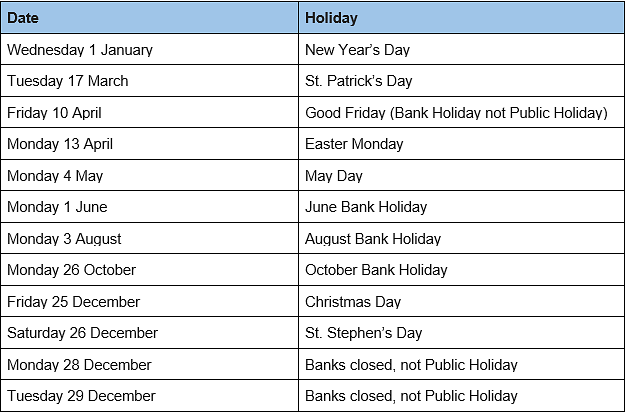From PAYE modernisation to the latest budget, employers in Ireland should prepare for Ireland’s 2020 payroll and tax schedule.
PAYE Modernisation Changes
The Irish government introduced PAYE modernisation on 1 January 2019. The project simplified the tax reporting process by replacing the annual P35 submission with the Employer Submission: a real-time reporting mechanism that incorporates all the information previously included in the P35. The PAYE modernisation process is ongoing and, in 2020, it will introduce the following changes to Ireland’s payroll landscape:
- Employee pay information will be included on a preliminary end of year statement that will be available from 15 January 2020. To review that statement, all employees must register on gov.ie by 31 October 2020 and submit Form 12. If employees do not register, Revenue will have the authority to adjust tax credits for over/under payment in 2019.
- Employers and payroll providers will no longer issue P60s to employees. Instead, employees must download the P21 ‘End of Year Statement’ which will serve as proof of income after the submission of Form 12.
- Effective in 2019, payroll providers no longer require Tax Relief at Source (TRS) information. Instead, the service provider will pass those details directly to Revenue.
Budget 2020
Minister for Finance, Paschal Donohoe, delivered Ireland’s 2020 Budget on 8 October 2019. Amongst the features of the 2020 budget, several measures specifically impact payroll:
- Tax credit thresholds and Standard Rate Cut-Off Points (SRCOPs) remain the same.
- Only one period of emergency tax credit (based on the Single Person Tax Credit) is permitted per employment. This means that if an employee leaves their employer, and then returns to the same employment at a later date, they will not be entitled to the 4 weeks of emergency tax credit that another new employee would receive.
- Universal Social Charge (USC) thresholds and USC calculations remain the same.
- Employee Pay Related Social Insurance (PRSI) thresholds and contribution rates remain the same.
- Employer PRSI contribution rates increase by 0.1% across all classes.
- Maternity and paternity benefits and illness benefits remain the same.
- Effective from 1 November 2019, Ireland’s new parental benefit scheme entitles both parents to 2 weeks of paid leave during the first 12 months after the birth of a child. The leave period will be increased to 7 weeks by 2021.
- In 2020, Ireland’s minimum hourly wage will increase to €10.10 but no specific implementation date has been set.
Ireland 2020 Bank Holidays
In 2020, Ireland’s bank holiday schedule is as follows:

Learn more about Ireland’s tax and payroll landscape by exploring our Global Insight Guide to Ireland.